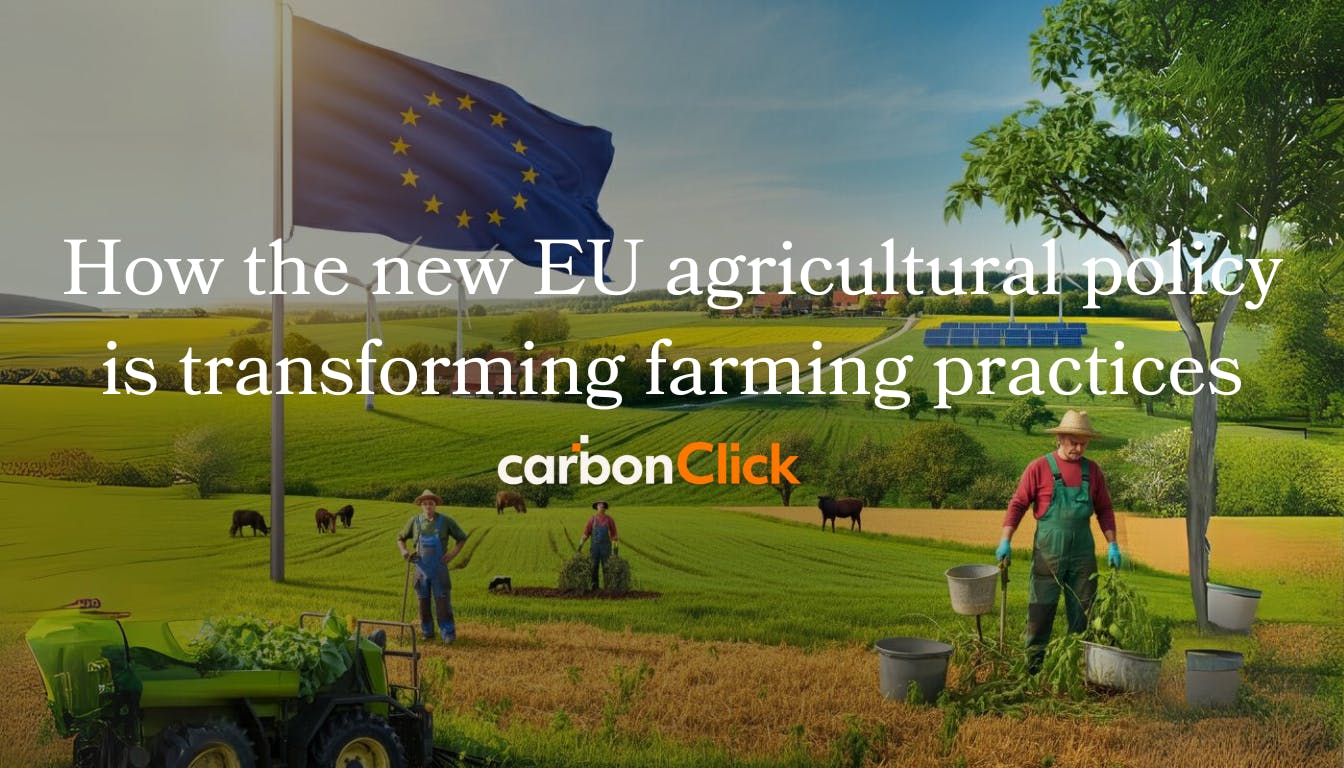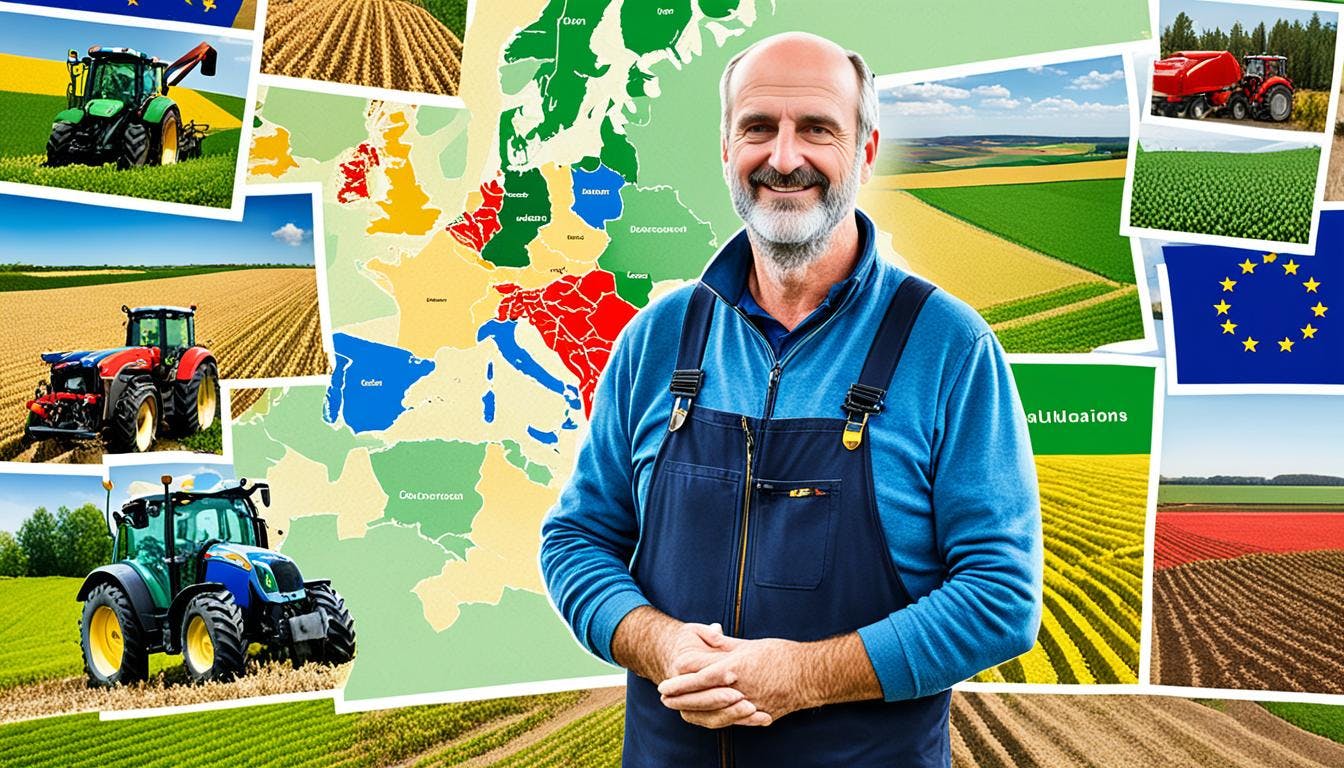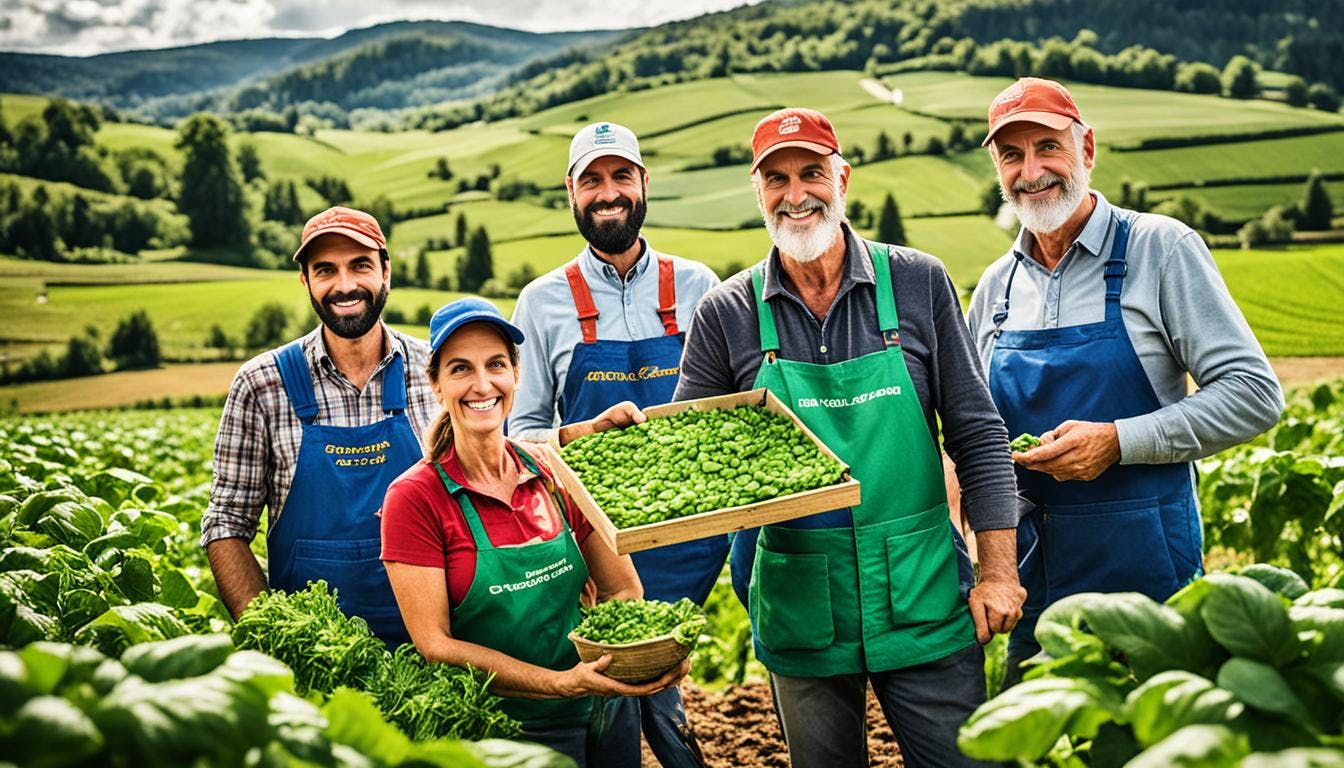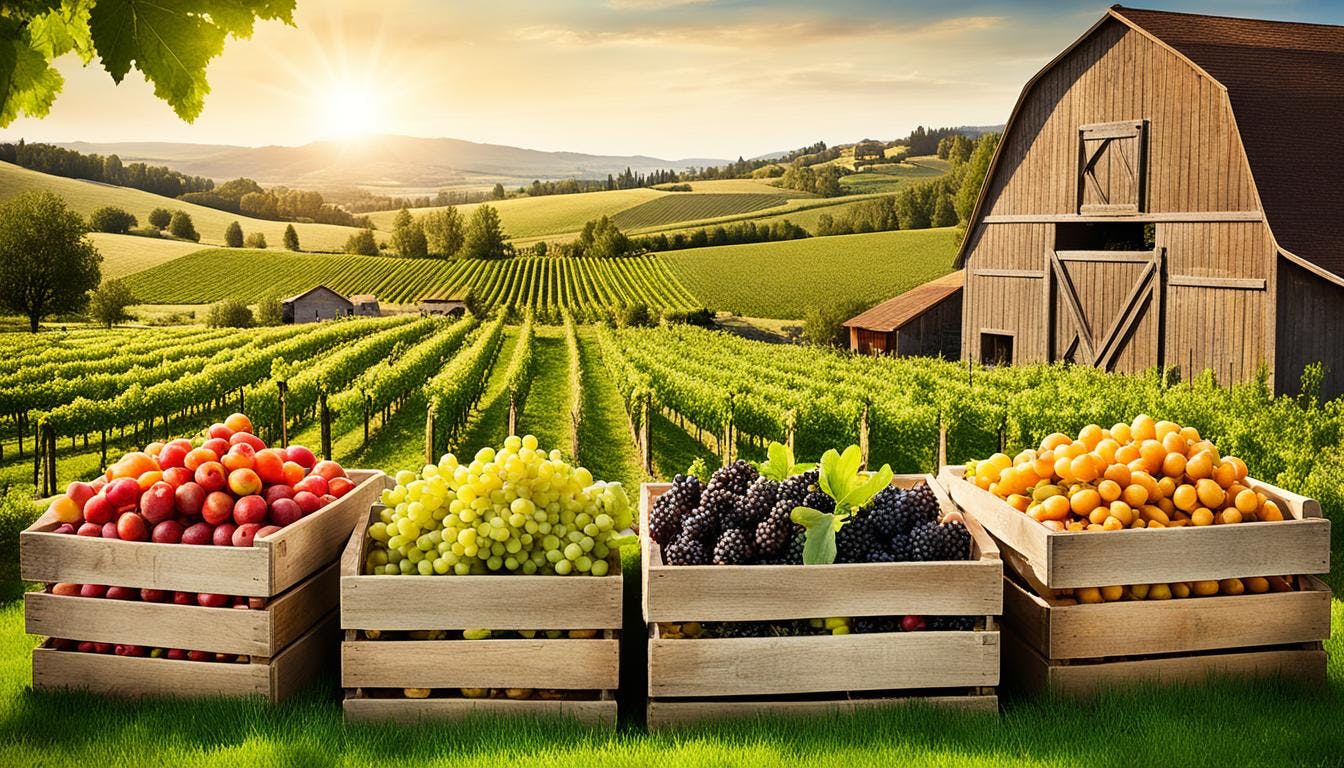Go the extra mile
Towards a cooler planet
How the new EU agricultural policy is transforming farming practices
1 February 2023
Did you know that nearly half of the European Union's land is dedicated to agriculture? This extensive area is set to benefit from the CAP 2023-27 reforms, which aim to make farming more sustainable and lessen its environmental impact.
On 2 December 2021, the European Union's member states agreed to simplify and modify the Common Agricultural Policy (CAP) regulations. Beginning on 1 January 2023, this new policy aims to achieve better integration of social, environmental, and economic objectives in agriculture, aligning with the goals of the European Deal.

How the new EU agricultural policy is transforming farming practices
The European Commission has introduced new rules for a fairer and more flexible farming approach. This benefits smaller farms and lets them tailor their farming to their needs. The new rules also allow farmers to use 4% of their land for crops that help the environment. This supports the EU's Farm to Fork and Biodiversity Strategies.
Key Takeaways
- Nearly half of the EU's territory is farmland, now subject to revamped regulations.
- The CAP 2023-27 reforms aim to establish a fairer and more sustainable agricultural policy.
- The policy offers support to smaller and younger farmers, encouraging inclusive growth.
- Environmental strategies are aligned with agricultural objectives to enhance sustainability.
- The EU Farm to Fork and Biodiversity Strategies are integral components of the new CAP.

Overview of the new EU Agricultural policy
The Common Agricultural Policy (CAP) for 2023–27 introduces significant changes to support sustainable farming in Europe. Covering over 10 million farms and employing 17 million people within the EU, the policy aims to enhance farming competitiveness while addressing environmental and social objectives.
CAP Strategic Plans
A view of a vast field with rows of crops neatly aligned, and a large EU flag in the background. The crops appear healthy and vibrant, reflecting the success of the new CAP strategic plans in improving agricultural practices.
Key Areas of Reform
The EU's new agricultural policy offers greater flexibility, allowing Member States to design CAP strategic plans tailored to their specific needs. Key changes include:
- Transitioning to sustainable farming methods, such as organic farming and agroforestry.
- Enhanced income support, with direct payments constituting about 70% of the CAP budget.
- Efforts to standardise income support to reduce disparities with non-agricultural income.
Main Objectives
The CAP’s primary goals are to make farming both sustainable and competitive, with 44 indicators in place to monitor progress. The main objectives are:
- To improve the environment through sustainable farming practices and targeted payments.
- To establish a robust system for annual progress monitoring.
- To support young farmers and enhance rural areas, providing better internet access for 18 million people.
The CAP is underpinned by two principal funds: the European Agricultural Guarantee Fund (EAGF) and the European Agricultural Fund for Rural Development (EAFRD). These funds assist rural economies and promote greater participation of women in farming, focusing on productivity and sustainability, while ensuring that EU policies align with the CAP's objectives.
Sustainability and environmental goals
In recent years, the CAP has set new goals to meet environmental and climate laws. It aims to support the EU’s targets through national CAP Strategies. These strategies focus on environmental and climate actions under the new regulations. Now, obtaining financial assistance is dependent on adhering to strict nature-related rules, such as preserving areas of land for natural habitats.
Targets of the European Deal
The CAP ensures that farming remains sustainable. Agriculture plays a crucial role in addressing climate challenges and preserving nature. Since farming in Europe accounted for 32% of emissions in 2020, substantial changes are required. The CAP is aligned with climate objectives, requiring farmers to contribute to achieving these targets. If the EU intensifies its efforts, farming emissions could be reduced by 5% by 2030.
Extreme weather in EU countries has led to significant financial losses, with the agricultural sector bearing more than half of these costs. The EU aims to prevent such disasters by promoting sustainable farming practices and enhancing the resilience of natural ecosystems.
Environmental Schemes
Environmental schemes are a major component of the CAP, receiving at least a quarter of direct payment funds. These schemes incentivise farmers to adopt environmentally responsible farming methods. This demonstrates the CAP’s strong commitment to sustainable agriculture, with approximately 40% of its budget allocated to climate and nature-related initiatives.
Farmers must comply with specific requirements to receive subsidies, including dedicating 4% of their land to natural habitats. The EU plans to support small-scale farmers by easing certain regulations. It also seeks to increase transparency in farming costs and improve market regulations to further sustainable agriculture.
The EU is also working towards halving food waste by 2030. A new plan aims to promote healthier eating habits, refine food purchasing rules, and provide clearer labelling. Environmental schemes and other CAP initiatives are integral to the EU’s vision for a sustainable future.


Social objectives in the CAP 2023-27
The new CAP 2023-27 framework places a strong emphasis on social sustainability in farming, addressing issues such as support for young farmers and promoting gender equity in agriculture.
Supporting Young Farmers
The CAP 2023-27 underscores the importance of attracting new entrants into the farming sector. It mandates that member states allocate at least 3% of their direct payments to young farmers. This initiative is designed to retain younger generations in farming, contributing to food security and the sustainability of agricultural practices.
The CAP for the 2023-2027 period will benefit from €270 billion in funding, with over €3 billion directly reaching young farmers in the seven countries for generational renewal support.
Gender equity and equality
The CAP 2023-27 places a significant emphasis on gender equality in farming. It marks the first time that gender parity and the participation of women have been established as central objectives. EU countries are required to assess and address gender-related challenges.
This initiative aims for a fair CAP that promotes gender equity, strengthening the agricultural workforce and enhancing social sustainability in farming.
With a focus on gender equality in agriculture, these measures will foster a more inclusive and innovative farming environment. This approach is expected to enhance productivity and sustainability across the EU.
Strategic plans and implementation
The implementation of CAP national plans under the 2023-2027 framework is crucial. Each member state designs these plans to meet their specific agricultural needs while aligning with EU agricultural strategies. Countries combine various interventions to harmonise income support with rural development.
Regulation (EU) 2024/1468 streamlines these strategies, aiming to reduce administrative burden, increase flexibility, and create a stable policy environment. For example, it simplifies the rules for national schemes, making compliance easier for countries.
Recent events, such as Russia’s invasion of Ukraine, have influenced the EU's agricultural policy, underscoring the need for adaptable and effective measures.
Member states now have the ability to define certain terms within their strategies, such as 'arable land' and 'permanent crops,’ allowing policies to be tailored to local farming conditions and needs.
The focus on sustainability is robust. By 2024, 7.5% of the budget will be allocated to biodiversity, increasing to 10% by 2026 and 2027. These measures are essential for enhancing rural development strategies, promoting sustainable farming, and protecting the environment.
The first year of the CAP Strategic Plans in 2023 demonstrated the importance of effective planning. Member states used these plans to improve their agricultural practices and reduce bureaucracy, making policies more efficient and easier to implement.


A focus on performance and results
The EU's Common Agricultural Policy (CAP) has undergone significant changes, with a greater focus on performance and results. This shift enhances accountability and transparency in monitoring agricultural policies, marking a considerable step forward.
Performance Monitoring
The revised CAP employs a set of performance indicators to assess progress. These metrics allow us to determine whether we are achieving our objectives. For instance, the Farm to Fork Strategy targets 25% of agriculture to be organic by 2030. It also seeks to reduce the use of pesticides and fertilisers. Every two years, we review CAP Strategic Plans to ensure they remain on track. This process encourages collaboration towards shared goals.
Evaluation Framework
The CAP's results-oriented approach is supported by a detailed evaluation framework. This framework assesses the effectiveness and efficiency of strategies, examining factors such as the number of farmers benefiting and the extent of peatland restoration. It also evaluates voluntary schemes for farmers and their role in addressing environmental challenges. By regularly reviewing the CAP's performance, we ensure that our farming policies are both effective and sustainable.
The CAP includes voluntary schemes for farmers, which, while sometimes complex, are scrutinised by the EU to determine their environmental benefits. This thorough evaluation ensures that our agricultural practices contribute to long-term sustainability.
By maintaining high standards, we ensure that our farming aligns with the CAP's objectives, guiding us towards a more sustainable future.
The role of innovation and knowledge in Modern Agriculture
In today's rapidly evolving farming landscape, continuous improvement is essential for a sustainable and resilient agricultural sector. Innovation has become a central component of modern farming, enhancing both productivity and sustainability.
The new Common Agricultural Policy (CAP) emphasises the significance of research and innovation. It has partnered with the Horizon Europe programme, which allocates approximately €10 billion for projects related to food, farming, and rural development.
Importance of Research
Horizon Europe's funding for agricultural research is crucial for initiating new projects. These funds drive significant advancements, making farming more efficient, reducing environmental impact, and addressing challenges related to climate change.
This funding is vital for overcoming emerging challenges and developing new farming techniques and technologies.
Farm Advisory Services
Farm advisory services play a pivotal role in disseminating agricultural knowledge. They convey important research findings to farmers, enabling them to adopt best practices.
These services create a link between researchers and farmers, fostering an environment where new ideas can be effectively implemented in practical settings.
Integrating these services into the CAP ensures seamless and effective knowledge transfer, helping farmers adopt new methods. This, in turn, enhances farming productivity and sustainability.
By supporting these services, we ensure that the benefits of new research are accessible to all stakeholders.
In summary, the combination of innovation, research funding, and farm advisory services through Horizon Europe contributes to a forward-looking and robust agricultural sector.


Income support and fair distribution
The CAP 2023-27 framework introduces a new income support system aimed at ensuring fair agricultural support across the EU. This system is particularly beneficial for smaller and medium-scale farmers. Over the past decade, income support has accounted for approximately half of farmers' earnings on average.
Redistributive Income Support Tool
A central element of this new framework is the redistributive income support tool. This tool ensures that at least 10% of direct payments are allocated to income redistribution. The EU budget allocates nearly €188 billion for income support from 2023 to 2027. Payments start at €200 per hectare in 2023, rising to €215 per hectare by 2027. This support is vital for assisting farmers in countries where the average payment is below 90% of the EU average.
Different CAP payments influence income in various ways. General direct payment schemes typically help to equalise income, whereas payments for animal welfare or environmental initiatives have a lesser impact on income. This highlights the need for a tailored approach to maximise the effectiveness of these supports.
Income support benefits around 6 million farms throughout the EU. It helps reduce income inequality and supports sustainable agricultural growth.
Active Farmers definition
The definition of an “active farmer” has been revised. The CAP now allows each country to establish its own criteria for defining an active farmer. These criteria determine eligibility for EU funding, ensuring that the process is fair and accessible to all.
These criteria are designed to ensure that only those genuinely engaged in farming receive support, maintaining the integrity and sustainability of the farm income policy.
These measures contribute to a more equitable distribution of resources, aligning with the CAP's goal of income redistribution and promoting sustainable farming practices.
Leveraging market orientation
The new Common Agricultural Policy (CAP) for 2023-27 places significant emphasis on market orientation. This approach is crucial for strengthening farmers' positions within the supply chain and enhancing the competitiveness of the agri-food sector. By implementing changes in the agricultural market, we aim to make farmers more robust and resilient to market fluctuations.
Improved Bargaining Power
The new CAP seeks to enhance farmers' bargaining power in negotiations. Rules that encourage cooperation are vital in this regard, enabling farmers to collaborate effectively. Producer groups and associations play a key role in planning, supply management, and identifying optimal market opportunities.
By collaborating, farmers can secure better prices and terms, thereby strengthening their position within the value chain.
Market-Based Strategies
The CAP also incorporates market-based strategies to support agriculture. A financial reserve of at least €450 million per year is in place to safeguard against market volatility. Specialised support is provided to sectors such as wine, fruit, vegetables, and olive oil to enhance their competitiveness.
With approximately €510 million allocated in 2023 for specific measures, we demonstrate our commitment to maintaining the stability and growth of the agri-food sector. These initiatives contribute to building a resilient and adaptable agricultural industry, capable of overcoming challenges and seizing new opportunities.

FAQ's
How does the new Common Agricultural Policy (CAP) of 2023-27 align with the European Sustainability Deal?
The CAP 2023-27 is integral to the European Sustainability Deal, supporting the Farm to Fork and biodiversity strategies. The policy emphasises sustainability, incorporating stringent environmental and climate-related regulations. It links payments to environmentally conscious practices and allocates a significant portion of the budget to schemes and farming methods that reduce climate impact.
What are the main objectives of the new Common Agricultural Policy?
The CAP 2023-27 has ten primary goals aimed at achieving social, ecological, and economic sustainability in European agriculture and rural areas. It provides support to small farms, enhances rural development, and assists young farmers. Additionally, it promotes gender equality and improves the competitiveness of the agricultural sector.
What are EU member states required to do under CAP 2023-27?
EU member states are required to develop national strategic plans that align with the CAP's objectives while addressing their specific needs. These plans outline how CAP funds will be utilised to support income, rural development, and market measures. Member states must also comply with the CAP's strengthened environmental and social standards.
How does CAP 2023-27 support young farmers?
The CAP mandates that member states allocate at least 3% of their direct payments budget to support young farmers. This initiative aims to encourage young people to enter and remain in farming by providing financial assistance and opportunities within the rural economy.
What are eco-schemes and how do they fit into CAP 2023-27?
Eco-schemes are a crucial component of the CAP's environmental agenda. At least 25% of direct payments must be directed towards these schemes, which encourage farmers to adopt environmentally conscious practices. These practices include organic farming, precision agriculture, and biodiversity conservation.
How will the performance of CAP 2023-27 be monitored and evaluated?
The performance of the CAP will be assessed through a comprehensive framework that includes a set of indicators and regular reporting. Member states are required to review their progress twice a year to ensure they meet the CAP's targets, maintaining the policy's effectiveness and focus.
How does the CAP 2023-27 foster innovation and knowledge sharing in agriculture?
CAP 2023-27 invests in research, innovation, and knowledge sharing to advance agricultural practices. It utilises €10 billion from Horizon Europe for projects in food, farming, and rural development. Additionally, it strengthens systems for disseminating new farming techniques and technologies.
What is the role of the redistributive income support tool in CAP 2023-27?
The redistributive income support tool aims to equalise farming income by ensuring that at least 10% of direct payments are allocated to smaller and medium-scale farmers. This approach ensures that support is equitable and reaches those who need it most.
How are "active farmers" defined under the reformed CAP?
Under the reformed CAP, "active farmers" are defined by each member state according to their specific needs. This definition ensures that EU funding is directed towards those actively engaged in farming, focusing the CAP on sustainable agriculture.
How does CAP 2023-27 aim to improve farmers' bargaining power within the market?
The CAP enhances farmers' bargaining power by improving rules on cooperation and supporting producer organisations. This gives farmers greater influence within the supply chain. Additionally, the policy includes a financial reserve to address market crises.
17 South Street
Auckland 1010
New Zealand
info@carbonclick.com- -
- X
Sign up. Be inspired. Get clicking.
Subscribe now to stay up to date with CarbonClick, carbon offsetting and climate action.
By signing up you agree to our Privacy Policy.


